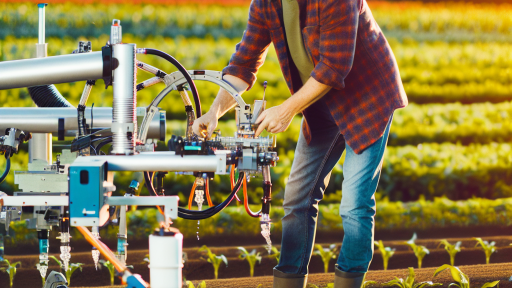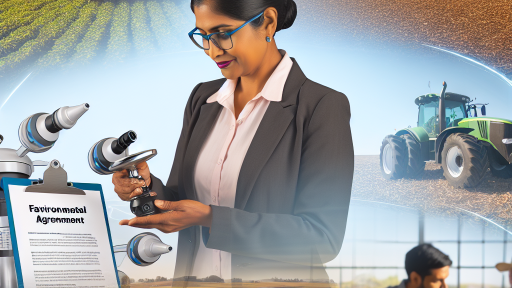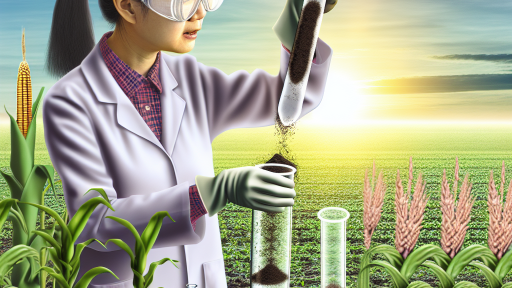Introduction to Agri-Fintech and Its Relevance in Agriculture
Defining Agri-Fintech
Agri-Fintech combines agriculture and financial technology.
This sector leverages innovative financial solutions for farmers.
It addresses specific agricultural challenges faced by producers.
Moreover, Agri-Fintech enhances financial inclusion in rural areas.
Importance in Agriculture
Agri-Fintech plays a vital role in supporting sustainable growth.
It provides essential funding for modern agricultural practices.
Additionally, it offers tools that aid in resource management.
This integration boosts productivity and efficiency on farms.
Key Technologies in Agri-Fintech
Multiple technologies drive the Agri-Fintech revolution.
Mobile banking apps facilitate easy access to financial services.
Data analytics tools enable farmers to make informed decisions.
Blockchain technology enhances transparency and security in transactions.
Real-World Applications
Farmers utilize Agri-Fintech for diverse applications.
Microloans help smallholder farmers invest in their operations.
Insurance products protect against crop failures and adverse weather.
Transform Your Agribusiness
Unlock your farm's potential with expert advice tailored to your needs. Get actionable steps that drive real results.
Get StartedInvestment platforms allow farmers to secure funding from investors.
Benefits of Agri-Fintech
Agri-Fintech offers numerous benefits for the agricultural sector.
It improves access to financial resources for farmers.
Furthermore, it enhances productivity through data-driven insights.
Additionally, it empowers farmers with better risk management strategies.
The Future of Agri-Fintech
The future of Agri-Fintech looks promising and transformative.
Innovations will continue to emerge, enhancing agricultural practices.
Moreover, increased investment in this sector will drive growth.
Governments and organizations must support this technological shift.
Overview of Sustainable Agricultural Practices
Importance of Sustainable Agriculture
Sustainable agriculture plays a crucial role in our food systems.
It focuses on environmental health, economic profitability, and social equity.
By implementing these practices, farmers can reduce resource depletion.
Sustainable methods lead to healthier soil and ecosystems.
Moreover, they enhance food security for future generations.
Key Principles of Sustainable Agronomy
Several principles guide sustainable agricultural practices.
- Conservation of natural resources is central.
- Diverse crop rotation supports soil health.
- Organic farming reduces chemical usage.
- Integrated pest management minimizes harmful effects on ecosystems.
These principles improve resilience against climate change.
They also increase biodiversity in agricultural landscapes.
Benefits of Sustainable Practices
Sustainable agriculture presents numerous benefits that extend beyond farming.
- It improves water quality and conserves water resources.
- It reduces greenhouse gas emissions.
- Farmers experience enhanced productivity over time.
- It fosters community engagement and support.
Additionally, sustainable farming practices often lead to healthier food products.
These practices create a more stable economy for rural communities.
Transitioning to Sustainable Practices
Transitioning to sustainable agriculture requires commitment and strategy.
Farmers often need education and resources to make changes.
Government policies can provide crucial support during this process.
Financial tools and agri-fintech innovations can aid in this transition.
Showcase Your Farming Business
Publish your professional farming services profile on our blog for a one-time fee of $200 and reach a dedicated audience of farmers and agribusiness owners.
Publish Your ProfileCollaboration among stakeholders is essential for success.
The Intersection of Technology and Agriculture
Introduction to Agri-Fintech
Agri-fintech blends finance and technology for agricultural advancements.
This innovative approach empowers farmers with better financial tools.
Moreover, it enhances farm productivity by enabling access to resources.
Enhancing Access to Capital
Access to capital is crucial for successful farming operations.
Agri-fintech platforms offer quick loans tailored for farmers’ needs.
Many smallholder farmers lack credit history; fintech addresses this issue.
- Crowdfunding platforms connect farmers with interested investors.
- Peer-to-peer lending models provide alternative funding options.
- Microloans enable farmers to invest in necessary equipment.
Streamlining Financial Management
Effective financial management is key to farm sustainability.
Agri-fintech solutions provide budgeting and expense tracking tools.
Farmers gain insights into cash flow and profitability through apps.
Consequently, they can make informed financial decisions.
Data-Driven Insights
Data analytics plays a pivotal role in modern agriculture.
Agri-fintech utilizes data to enhance farming practices.
Farmers can analyze weather patterns and soil conditions effectively.
Timely insights lead to improved crop yields and reduced waste.
Facilitating Market Access
Market access is crucial for farmers to sell their produce.
Agri-fintech platforms connect farmers directly to buyers.
This reduces reliance on middlemen and boosts profit margins.
- E-commerce channels enable farmers to showcase their products.
- Logistics solutions streamline the delivery process.
- Digital marketing tools help farmers reach broader audiences.
Supporting Sustainable Practices
Sustainability is at the heart of modern agricultural practices.
Agri-fintech promotes practices that protect the environment.
Farmers can adopt precision agriculture techniques using tech solutions.
This approach minimizes resource wastage and reduces environmental impact.
Empowering Smallholder Farmers
Smallholder farmers often face unique challenges.
Agri-fintech provides tailored solutions to address these issues.
Access to education and training helps them utilize technology effectively.
- Workshops on financial literacy enhance decision-making skills.
- Mobile apps offer information on best farming practices.
- Community forums provide peer support and sharing of experiences.
The Future of Agri-Fintech
The future of agri-fintech is bright and full of potential.
Innovations will continue to empower farmers for sustainable growth.
Investment in technology will drive agricultural productivity forward.
As a result, the sector will contribute significantly to food security.
Explore Further: Future Trends In Farm Management Software Technology
Case Studies of Successful Agri-Fintech Implementations
Innovative Financing Solutions in India
In India, the company Kshetra Agritech has transformed lending for farmers.
They use data analytics to assess creditworthiness effectively.
This method reduces loan defaults significantly.
Moreover, farmers gain timely access to funds for seeds and fertilizers.
As a result, crop yields increase, supporting sustainable practices.
Digital Marketplaces in Africa
The startup AgriDigital has created a digital platform for farmers in Africa.
This platform connects producers directly with consumers.
It eliminates middlemen, ensuring better prices for farmers.
Additionally, the platform offers flexible payment terms.
This encourages farmers to scale their operations sustainably.
Showcase Your Farming Business
Publish your professional farming services profile on our blog for a one-time fee of $200 and reach a dedicated audience of farmers and agribusiness owners.
Publish Your ProfilePrecision Agriculture in North America
Farmers in North America have embraced precision agriculture technologies.
Companies like CropX provide soil management solutions.
These technologies help farmers optimize water and fertilizer use.
Consequently, this lowers costs and reduces environmental impacts.
Farmers report improved crop health and yields.
Blockchain for Transparency in Supply Chains
The introduction of blockchain technology has improved agricultural transparency.
In South America, BanQu is using blockchain to track coffee production.
This innovation offers farmers secure payments and market access.
Moreover, consumers benefit from verified product origins.
This fosters trust and encourages sustainable sourcing practices.
Mobile Banking Solutions in Southeast Asia
Mobile banking has revolutionized how farmers in Southeast Asia manage finances.
The app Bamboos has provided seamless transaction platforms.
Farmers can receive payments directly, reducing reliance on cash.
This shift enhances financial security and promotes saving habits.
Importantly, it supports investment in sustainable farming technologies.
Find Out More: Using Remote Sensing to Detect Crop Diseases
Financial Inclusion for Smallholder Farmers through Agri-Fintech Solutions
Importance of Financial Inclusion
Financial inclusion is pivotal for smallholder farmers’ success.
It enables them to access necessary financial services.
Many smallholder farmers face significant barriers to financing.
Accessing loans, insurance, and savings products is often limited.
Thus, financial inclusion allows farmers to invest in their operations.
Agri-Fintech Solutions Overview
Agri-Fintech solutions bridge the gap between farmers and financial institutions.
These innovative platforms bring financial services directly to farmers.
Moreover, they utilize mobile technology for greater accessibility.
Farmers can easily apply for loans through user-friendly apps.
These services often feature lower transaction costs and better terms.
Examples of Successful Agri-Fintech Initiatives
Many companies demonstrate the effectiveness of Agri-Fintech solutions.
For instance, FinAgri empowers farmers by providing credit access.
They use data analytics to assess creditworthiness accurately.
Another example is GreenField, which offers micro-insurance products.
This enables farmers to safeguard their investments against risks.
Impact on Smallholder Farmers
The impact of Agri-Fintech on smallholder farmers is profound.
Access to credit boosts their productivity and income.
Furthermore, farmers can diversify their crops and enhance food security.
Ultimately, financial services foster sustainable agricultural growth.
This leads to improved livelihoods and community development.
Challenges and Barriers
Despite progress, challenges remain in achieving financial inclusion.
Digital literacy among farmers often limits technology use.
Additionally, infrastructure issues hinder access to financial services.
Moreover, some farmers struggle with trust in digital platforms.
Showcase Your Farming Business
Publish your professional farming services profile on our blog for a one-time fee of $200 and reach a dedicated audience of farmers and agribusiness owners.
Publish Your ProfileAddressing these barriers is crucial for maximizing Agri-Fintech’s potential.
The Future of Agri-Fintech
The future of Agri-Fintech looks promising for smallholder farmers.
Continued advancements in technology will enhance accessibility.
In particular, artificial intelligence can improve risk assessment models.
With more robust solutions, farmers will receive tailored financial products.
In essence, Agri-Fintech can drive sustainable agricultural growth further.
Find Out More: Automated Machinery Safety Practices For Farmers

The Role of Big Data and Analytics in Enhancing Agricultural Productivity
Understanding Big Data in Agriculture
Big data refers to large volumes of data collected from various sources.
This data includes weather patterns, soil conditions, and crop health information.
Moreover, it enables farmers to make informed decisions about their practices.
Increasing Efficiency Through Analytics
Analytics transforms raw data into actionable insights.
Farmers can identify trends and patterns from historical data.
As a result, they can optimize planting schedules and resource usage.
Predictive Analytics in Crop Yield
Predictive analytics utilizes historical data to forecast future outcomes.
Farmers can predict crop yields based on various conditions.
This approach aids in adjusting strategies for potential issues like droughts.
Precision Agriculture Techniques
Precision agriculture harnesses big data for targeted farming practices.
This includes using sensors to monitor crop health in real-time.
Consequently, farmers can apply fertilizers and pesticides more effectively.
Financial Benefits of Data Utilization
Utilizing big data can lead to significant cost reductions.
Farmers can minimize waste and improve their overall profitability.
Furthermore, they can allocate resources more efficiently with data insights.
Collaborative Efforts with Agri-Fintech
Agri-fintech partnerships enhance the reach of big data solutions.
This collaboration provides farmers access to advanced analytics tools.
Consequently, they can leverage financial technology for improved decision-making.
Uncover the Details: Data-Enhanced Decision Making for Farmers
Challenges and Barriers to Adoption of Agri-Fintech Among Farmers
Understanding the Current Landscape
Many farmers face significant challenges with Agri-Fintech adoption.
Limited access to technological infrastructure is a primary concern.
Additionally, inadequate financial literacy can hinder effective usage.
Economic Constraints
High initial costs often deter farmers from investing in Agri-Fintech solutions.
Many smallholders operate on tight budgets, restricting their options.
Furthermore, uncertain ROI may lead to cautious behavior among farmers.
Cultural and Social Factors
Cultural resistance can impede the acceptance of new technologies.
Some farmers prefer traditional methods over technological advancements.
Moreover, social networks influence the decision to adopt new solutions.
Regulatory and Policy Barriers
Inconsistent regulations can create confusion among farmers.
Policy support for Agri-Fintech remains limited in many regions.
Additionally, complex compliance processes may discourage participation.
Technological Readiness
Farmers often face a knowledge gap concerning Agri-Fintech tools.
Lack of training and support can complicate effective implementation.
Showcase Your Farming Business
Publish your professional farming services profile on our blog for a one-time fee of $200 and reach a dedicated audience of farmers and agribusiness owners.
Publish Your ProfileAdditionally, there is often insufficient internet connectivity in rural areas.
Trust and Security Concerns
Data privacy issues can significantly impact farmers’ willingness to adopt Agri-Fintech.
Many are uncertain about how their data will be used and shared.
Trust in technology providers is crucial for successful adoption.
Future Trends in Agri-Fintech and Their Potential Impact on Sustainable Agriculture
Technological Advancements in Data Analytics
Innovations in data analytics are transforming agri-fintech.
Farmers can now access real-time data to make informed decisions.
This leads to better resource allocation and improved crop yields.
Consequently, it enhances sustainability in agricultural practices.
Integration of Blockchain for Transparency
Blockchain technology offers increased transparency in supply chains.
This reduces fraud and ensures fair trading practices.
Moreover, it builds trust between farmers and consumers.
Such transparency supports sustainable practices and ethical sourcing.
Access to Microfinancing Solutions
Microfinancing provides smallholder farmers with necessary funds.
This allows them to invest in sustainable technologies.
As a result, productivity and environmental impact improve.
Furthermore, it empowers farmers to adapt to climate change.
Mobile Applications for Improved Connectivity
Mobile technology facilitates better connectivity for farmers.
Farmers can access market information and financial services easily.
This connectivity promotes informed decision-making and efficiency.
Ultimately, it promotes sustainable agricultural practices.
The Role of AI in Precision Agriculture
Artificial intelligence is revolutionizing precision agriculture.
AI-driven tools help optimize resource use and reduce waste.
This leads to significant improvements in sustainability.
Additionally, AI can predict crop trends and weather patterns.
Collaborative Platforms for Knowledge Sharing
Agri-fintech encourages collaboration among stakeholders.
Knowledge-sharing platforms enhance learning and innovation.
This fosters the adoption of sustainable practices across regions.
Moreover, it strengthens community ties and resilience.
Additional Resources
Shirin Ghatrehsamani (Samani), Ph.D. – Assistant Professor – Penn …
Small Business Innovation Research and Technology Transfer …




